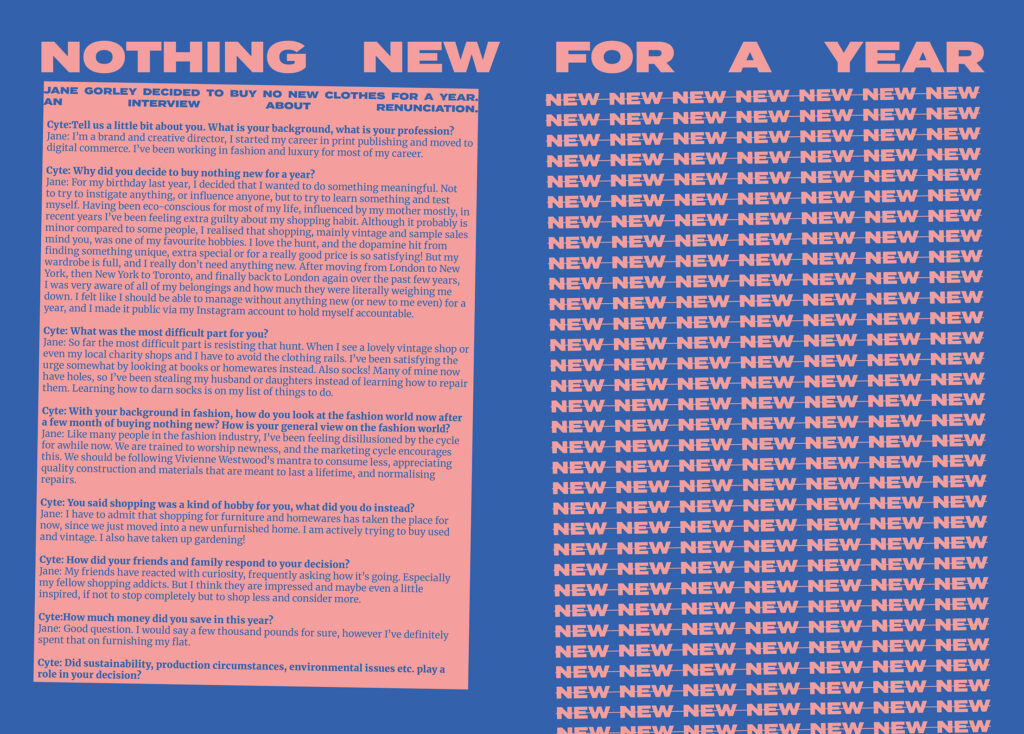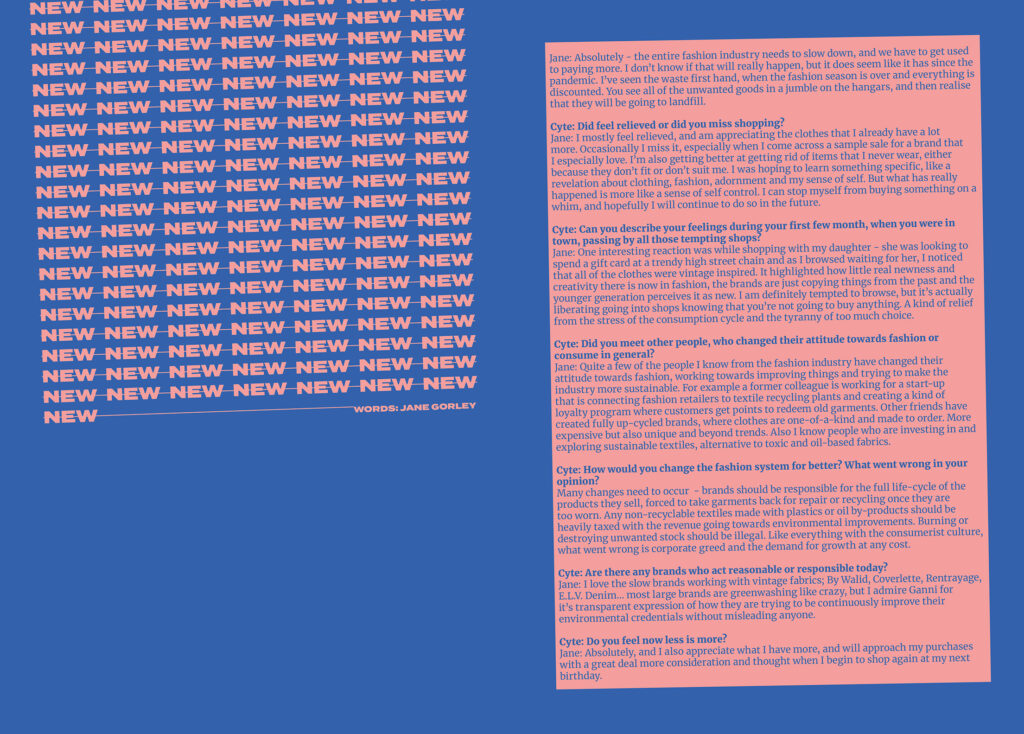

NOTHING NEW FOR A YEAR
Jane Gorley decided to buy no new clothes for a year.
An interview about renunciation.
Cyte:Tell us a little bit about you. What is your background, what is your profession? Jane: I’m a brand and creative director, I started my career in print publishing and moved to digital commerce. I’ve been working in fashion and luxury for most of my career.
Cyte: Why did you decide to buy nothing new for a year?
Jane: For my birthday last year, I decided that I wanted to do something meaningful. Not to try to instigate anything, or influence anyone, but to try to learn something and test myself. Having been eco-conscious for most of my life, influenced by my mother mostly, in recent years I’ve been feeling extra guilty about my shopping habit. Although it probably is minor compared to some people, I realised that shopping, mainly vintage and sample sales mind you, was one of my favourite hobbies. I love the hunt, and the dopamine hit from finding something unique, extra special or for a really good price is so satisfying! But my wardrobe is full, and I really don’t need anything new. After moving from London to New York, then New York to Toronto, and finally back to London again over the past few years, I was very aware of all of my belongings and how much they were literally weighing me down. I felt like I should be able to manage without anything new (or new to me even) for a year, and I made it public via my Instagram account to hold myself accountable.
Cyte: What was the most difficult part for you?
Jane: So far the most difficult part is resisting that hunt. When I see a lovely vintage shop or even my local charity shops and I have to avoid the clothing rails. I’ve been satisfying the urge somewhat by looking at books or homewares instead. Also socks! Many of mine now have holes, so I’ve been stealing my husband or daughters instead of learning how to repair them. Learning how to darn socks is on my list of things to do.
Cyte: With your background in fashion, how do you look at the fashion world
now after a few month of buying nothing new? How is your general view
on the fashion world?
Jane: Like many people in the fashion industry, I’ve been feeling disillusioned by the cycle for awhile now. We are trained to worship newness, and the marketing cycle encourages this. We should be following Vivienne Westwood’s mantra to consume less, appreciating quality construction and materials that are meant to last a lifetime, and normalising repairs.
Cyte: You said shopping was a kind of hobby for you, what did you do instead?
Jane: I have to admit that shopping for furniture and homewares has taken the place for now, since we just moved into a new unfurnished home. I am actively trying to buy used and vintage. I also have taken up gardening!
Cyte: How did your friends and family respond to your decision?
Jane: My friends have reacted with curiosity, frequently asking how it’s going. Especially my fellow shopping addicts. But I think they are impressed and maybe even a little inspired, if not to stop completely but to shop less and consider more.
Cyte:How much money did you save in this year?
Jane: Good question. I would say a few thousand pounds for sure, however I’ve definitely spent that on furnishing my flat.
Cyte: Did sustainability, production circumstances, environmental issues etc. play
a role in your decision?
Jane: Absolutely – the entire fashion industry needs to slow down, and we have to get used to paying more. I don’t know if that will really happen, but it does seem like it has since the pandemic. I’ve seen the waste first hand, when the fashion season is over and everything is discounted. You see all of the unwanted goods in a jumble on the hangars, and then realise that they will be going to landfill.
Cyte: Did feel relieved or did you miss shopping?
Jane: I mostly feel relieved, and am appreciating the clothes that I already have a lot more. Occasionally I miss it, especially when I come across a sample sale for a brand that I especially love. I’m also getting better at getting rid of items that I never wear, either because they don’t fit or don’t suit me. I was hoping to learn something specific, like a revelation about clothing, fashion, adornment and my sense of self. But what has really happened is more like a sense of self control. I can stop myself from buying something on a whim, and hopefully I will continue to do so in the future.
Cyte: Can you describe your feelings during your first few month, when you were in town, passing by all those tempting shops?
Jane: One interesting reaction was while shopping with my daughter – she was looking to spend a gift card at a trendy high street chain and as I browsed waiting for her, I noticed that all of the clothes were vintage inspired. It highlighted how little real newness and creativity there is now in fashion, the brands are just copying things from the past and the younger generation perceives it as new. I am definitely tempted to browse, but it’s actually liberating going into shops knowing that you’re not going to buy anything. A kind of relief from the stress of the consumption cycle and the tyranny of too much choice.
Cyte: Did you meet other people, who changed their attitude towards fashion or consume in general?
Jane: Quite a few of the people I know from the fashion industry have changed their attitude towards fashion, working towards improving things and trying to make the industry more sustainable. For example a former colleague is working for a start-up that is connecting fashion retailers to textile recycling plants and creating a kind of loyalty program where customers get points to redeem old garments. Other friends have created fully up-cycled brands, where clothes are one-of-a-kind and made to order. More expensive but also unique and beyond trends. Also I know people who are investing in and exploring sustainable textiles, alternative to toxic and oil-based fabrics.
Cyte: How would you change the fashion system for better? What went wrong in your opinion?
Many changes need to occur – brands should be responsible for the full life-cycle of the products they sell, forced to take garments back for repair or recycling once they are too worn. Any non-recyclable textiles made with plastics or oil by-products should be heavily taxed with the revenue going towards environmental improvements. Burning or destroying unwanted stock should be illegal. Like everything with the consumerist culture, what went wrong is corporate greed and the demand for growth at any cost.
Cyte: Are there any brands who act reasonable or responsible today?
Jane: I love the slow brands working with vintage fabrics; By Walid, Coverlette, Rentrayage, E.L.V. Denim… most large brands are greenwashing like crazy, but I admire Ganni for it’s transparent expression of how they are trying to be continuously improve their environmental credentials without misleading anyone.
Cyte: Do you feel now less is more?
Jane: Absolutely, and I also appreciate what I have more, and will approach my purchases with a great deal more consideration and thought when I begin to shop again at my next birthday.